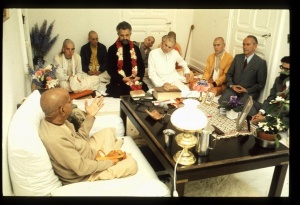CC Madhya 20.267: Difference between revisions
No edit summary |
(Vanibot #0054 edit - transform synonyms into clickable links, which search similar occurrences) |
||
| Line 19: | Line 19: | ||
<div class="synonyms"> | <div class="synonyms"> | ||
''ādyaḥ avatāraḥ'' | ''[//vanipedia.org/wiki/Special:VaniSearch?s=ādyaḥ&tab=syno_o&ds=1 ādyaḥ] [//vanipedia.org/wiki/Special:VaniSearch?s=avatāraḥ&tab=syno_o&ds=1 avatāraḥ]'' — the original incarnation; ''[//vanipedia.org/wiki/Special:VaniSearch?s=puruṣaḥ&tab=syno_o&ds=1 puruṣaḥ]'' — Kāraṇābdhiśāyī Viṣṇu; ''[//vanipedia.org/wiki/Special:VaniSearch?s=parasya&tab=syno_o&ds=1 parasya]'' — of the Supreme Lord; ''[//vanipedia.org/wiki/Special:VaniSearch?s=kālaḥ&tab=syno_o&ds=1 kālaḥ]'' — time; ''[//vanipedia.org/wiki/Special:VaniSearch?s=svabhāvaḥ&tab=syno_o&ds=1 svabhāvaḥ]'' — space; ''[//vanipedia.org/wiki/Special:VaniSearch?s=sat&tab=syno_o&ds=1 sat]-[//vanipedia.org/wiki/Special:VaniSearch?s=asat&tab=syno_o&ds=1 asat]'' — cause and effect; ''[//vanipedia.org/wiki/Special:VaniSearch?s=manaḥ&tab=syno_o&ds=1 manaḥ] [//vanipedia.org/wiki/Special:VaniSearch?s=ca&tab=syno_o&ds=1 ca]'' — as well as the mind; ''[//vanipedia.org/wiki/Special:VaniSearch?s=dravyam&tab=syno_o&ds=1 dravyam]'' — the five elements; ''[//vanipedia.org/wiki/Special:VaniSearch?s=vikāraḥ&tab=syno_o&ds=1 vikāraḥ]'' — transformation or the false ego; ''[//vanipedia.org/wiki/Special:VaniSearch?s=guṇaḥ&tab=syno_o&ds=1 guṇaḥ]'' — modes of nature; ''[//vanipedia.org/wiki/Special:VaniSearch?s=indriyāṇi&tab=syno_o&ds=1 indriyāṇi]'' — senses; ''[//vanipedia.org/wiki/Special:VaniSearch?s=virāṭ&tab=syno_o&ds=1 virāṭ]'' — the universal form; ''[//vanipedia.org/wiki/Special:VaniSearch?s=svarāṭ&tab=syno_o&ds=1 svarāṭ]'' — Garbhodakaśāyī Viṣṇu; ''[//vanipedia.org/wiki/Special:VaniSearch?s=sthāsnu&tab=syno_o&ds=1 sthāsnu]'' — immovable; ''[//vanipedia.org/wiki/Special:VaniSearch?s=cariṣṇu&tab=syno_o&ds=1 cariṣṇu]'' — movable; ''[//vanipedia.org/wiki/Special:VaniSearch?s=bhūmnaḥ&tab=syno_o&ds=1 bhūmnaḥ]'' — of the Supreme Personality of Godhead. | ||
</div> | </div> | ||
Latest revision as of 22:41, 19 February 2024

A.C. Bhaktivedanta Swami Prabhupada
TEXT 267
- ādyo ’vatāraḥ puruṣaḥ parasya
- kālaḥ svabhāvaḥ sad-asan manaś ca
- dravyaṁ vikāro guṇa indriyāṇi
- virāṭ svarāṭ sthāsnu cariṣṇu bhūmnaḥ
SYNONYMS
ādyaḥ avatāraḥ — the original incarnation; puruṣaḥ — Kāraṇābdhiśāyī Viṣṇu; parasya — of the Supreme Lord; kālaḥ — time; svabhāvaḥ — space; sat-asat — cause and effect; manaḥ ca — as well as the mind; dravyam — the five elements; vikāraḥ — transformation or the false ego; guṇaḥ — modes of nature; indriyāṇi — senses; virāṭ — the universal form; svarāṭ — Garbhodakaśāyī Viṣṇu; sthāsnu — immovable; cariṣṇu — movable; bhūmnaḥ — of the Supreme Personality of Godhead.
TRANSLATION
“‘Kāraṇābdhiśāyī Viṣṇu [Mahā-Viṣṇu] is the first incarnation of the Supreme Lord, and He is the master of eternal time, space, cause and effects, the mind, the elements, the material ego, the modes of nature, the senses, the universal form of the Lord, Garbhodakaśāyī Viṣṇu and the sum total of all living beings, both moving and nonmoving.’
PURPORT
This is a quotation from Śrīmad-Bhāgavatam (SB 2.6.42). For an explanation, refer to Adi-līlā, Chapter Five, verse 83.